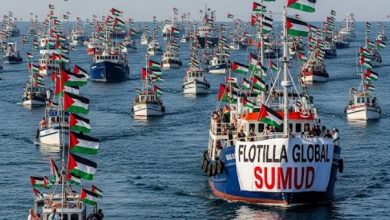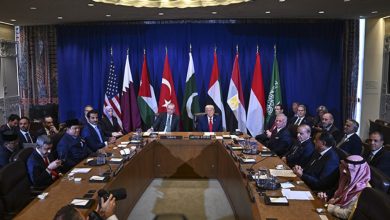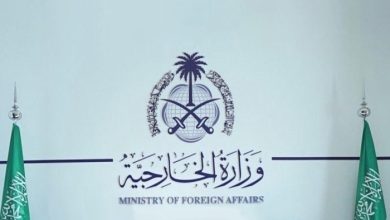Two-State Solution Conf.: Saudi-led Efforts Chart the Path for Regional Peace

Saudi Arabia and France jointly chaired a high-level UN conference for reviving the two-state solution and settling the Palestinian-Israeli conflict.
The High-Level International Conference on the Peaceful Settlement of the Palestinian Question and Implementation of the Two-State Solution culminated in a series of global recognitions of Palestinian Statehood and a unified call for ending the war in Gaza.
A Moment for Peace
In a joint statement, the leaders of Saudi Arabia and France praised countries that attended the conference in New York, which took place “at a historically critical moment for peace, security, and stability in the Middle East.”
The statement added that the conference adopted the New York Declaration, which the UN General Assembly (UNGA) endorsed with an overwhelming majority. The Declaration “reaffirms the unwavering international commitment to the Two-State solution and charts an irreversible pathway to build a better future for Palestinians, Israelis and all peoples of the region.”
It also offers “a principled, yet realistic alternative to the cycle of violence and endless wars,” as the situation in Gaza rapidly deteriorates amid the expanding Israeli ground offensive in Gaza City.
In the light of this, the statement called on the international community to “move from words to deeds” to swiftly implement the New York Declaration through “tangible, concrete and irreversible measures.”
Palestine Recognition
Several states formally recognized the State of Palestine at the UNGA, thanks to Saudi Arabia’s intensive diplomatic push. These countries include France, Australia, Belgium, Canada, Luxembourg, Malta, Portugal, the UK and Northern Ireland, Denmark, Andorra, Monaco and San Marino.
Within this context, the statement welcomed the recognition of Palestinian Statehood and called for other countries to join the initiative.
The recognition of Palestine paves the way for advancing the two-state solution, which envisages an independent Palestinian state in Gaza, the West Bank and East Jerusalem, living side by side in peace and security with Israel.
Gaza War
With regards to the war in Gaza, the statement stressed that ending the war and releasing the hostages remain “an absolute priority.” Hence, it urged for “a permanent ceasefire, the release of all hostages, exchange of prisoners, and unhindered delivery of humanitarian aid throughout Gaza and the full withdrawal of Israeli forces from the Strip.”
Moreover, the statement committed to supporting “the deployment of a temporary international stabilization mission upon invitation by the Palestinian Authority, to be mandated by the UN Security Council, in line with the New York Declaration.” It also committed to increasing support for training and equipping Palestinian police and security forces.
The statement also stressed the importance of the unification of Gaza Strip and the West Bank under the Palestinian Authority (PA), reaffirming the need for Hamas to end its rule of Gaza and disarm, in line with the objective of a sovereign Palestinian State.
Furthermore, it welcomed the reforms undertaken by the PA and the launching of the Emergency Coalition for Palestine to mobilize emergency budgetary support to the PA, inviting all States and international organizations to join this effort.
Rejecting Unilateral Measures
In their statement, the leaders of Saudi Arabia and France urged Israel to seize this opportunity for peace and issue a clear public commitment to the Two-State solution.
The statement called for halting all settlement and annexation activities, reiterating that any form of annexation is a “redline for the international community that bears serious consequences and constitutes a direct risk to existing and future peace agreements.”
In the light of this, it welcomed concrete measures taken by Member States to respond to “unilateral measures against the Two-State solution and to violations of international law” until Israel ends actions that endanger the two-state solution, in full compliance with international law.
The statement also stressed that “ending the Israeli occupation and achieving just and lasting peace between Palestinians and Israelis, based on the relevant UN resolutions, is the only way to achieve full regional integration, as provided for in the Arab Peace initiative.”
With regards to this, the statement welcomed “the commitment to explore a regional security architecture that could provide security guarantees for all, building on the experience of ASEAN and OSCE, paving the way for a more stable Middle East.”
International Unity
The Two-State Solution Conference underscored a clear and determined will to ensure justice for Palestinians in establishing an independent state that will pave the way for a two-state solution – the only viable path to peace in the region.
At the UN high-level gathering, around 40 international leaders condemned Israel’s war in Gaza and its government’s moves to expand settlements in the West Bank.
Additionally, many stressed that the recognition of a Palestinian state was not a reward to Hamas, reiterating their call for the disarmament of the group and its exclusion from future governance of the enclave. They also called for the release of the remaining hostages.
Historic Juncture
Delivering the Kingdom’s address, on behalf of the Saudi Crown Prince Mohammed bin Salman, the Saudi Foreign Minister, Prince Faisal bin Farhan, noted that the conference “represents a historic opportunity to achieve peace and to reaffirm the international community’s commitment to implementing the two-state solution.”
The conference convened amid Israel’s continued aggressive policies and brutal crimes against the Palestinian people in Gaza, its violations in the West Bank and Al-Quds Ash-Sharif, and its repeated assaults on the sovereignty of Arab and Islamic states – most recently the blatant aggression against the State of Qatar.
“These actions underscore Israel’s persistence in its hostile practices that threaten regional and international peace and security, undermine peace efforts in the region, and further reinforce the firm conviction that the two-state solution remains the only path to achieving a just and lasting peace,” Prince Faisal said.
He added that the endorsement of the New York Declaration “reflects the will of the international community to uphold justice for the Palestinian people and affirm their historical and legal rights in accordance with international references, relevant UN resolutions, and the Arab Peace Initiative.”
He also called other countries to recognize Palestinian Statehood as this move “will have a profound impact in supporting efforts to implement the two-state solution and achieve comprehensive and lasting peace in the Middle East, ushering in a new reality of security, stability, and prosperity for the region.”
France’s Bold Move
During the conference, France formally recognized the State of Palestine. “Due to the historic commitment of my country to the Middle East, to peace between the Israelis and the Palestinians, this is why I declare that today France recognizes the State of Palestine,” the French President, Emmanuel Macron, made the bold declaration on Monday.
He said that the time had come to stop the war and free the remaining Israeli hostages held by Hamas. “We must do everything in our power to preserve the possibility of a two-state solution” that would see “Israel and Palestine side by side in peace and security,” Macron noted.
He also said that France would only open an embassy to a Palestinian state when all the hostages being held by Hamas are released and a ceasefire had been agreed.










